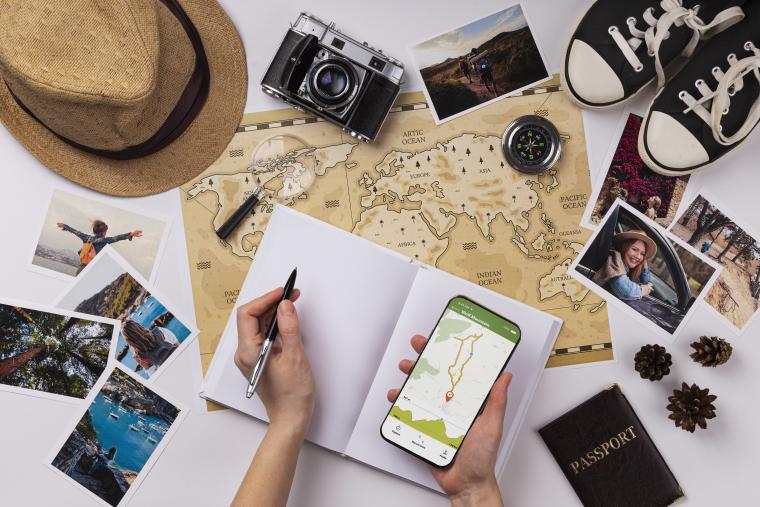Have you ever arrived somewhere and realised you forgot to pack your swimming costume? Or maybe you realised that you should have checked the weather before you left because it’s raining and you haven't brought a jacket or an umbrella. Travelling can be one of the most enriching things you can do in life. However, it is important to take into account that behind every unforgettable adventure there is a large amount of planning involved.
Besides choosing the destination, buying the flight ticket and booking the hotel, it is really important to plan every detail in advance so that you can enjoy it all without any stress. In this article, we will give you some pointers on how to plan your trip so that everything goes smoothly.
Key stages for planning a successful trip
When preparing for a trip, you need to choose your destination, book your flights and accommodation, and plan your itinerary. This will help you to avoid unforeseen problems so you can enjoy your trip without any worries.
Here is some advice on how to plan your trip.
Do your research on the destination
The first thing you should do is familiarise yourself with the destination. When is the best time to visit? Will you need a passport or visa? Does it have a different currency? Is it a safe place?
In addition, you should also become acquainted with the culture, local customs and the most interesting tourist attractions, which will help you to enjoy the experience much more. For example, if you are planning to visit Japan, you should be aware that in the temples it is compulsory to take your shoes off before entering.
Set a realistic budget
When planning your trip, it is very important that you calculate all the costs carefully:
- Flights and transport.
- Accommodation.
- Food.
- Activities and entrance fees.
- Travel Insurance.
- Extra money for unexpected events.
Choosing the right transport
The type of transport you choose will depend on the destination and the kind of trip you want to make. If air travel is your only option, buy tickets in advance to get better prices. Generally, for international flights, better prices can be obtained about two months in advance. If you prefer to travel by train, check for passes that save money on multiple journeys, such as the Eurail Pass in Europe.
Booking accommodation
The choice of accommodation is also crucial. As well as considering your budget, it is also important to consider the proximity to places of interest and the availability of parking or public transport.
For example, a hotel in a good location can save time and money on transport. Also, if you are travelling in a group, an apartment flat is often more convenient and cheaper than a hotel.
Plan your itinerary
Although it is not necessary to plan your trip down to the very last detail, it is important to have an idea of what you are going to do each day. A good strategy is to divide activities by different regions. This way, you will avoid wasting time on unnecessary journeys.
- Prioritise the most important places.
- Set aside free time to rest or for possible unforeseen events.
- Include free activities, such as admission to museums on certain days of the week.
- Research travellers' blogs to discover less touristy places.
- Large cities, such as Paris or New York, often offer sightseeing passes that include several attractions for a lower price.
Make sure you have the necessary documentation
Nothing ruins a trip more than having a problem with documentation. So before you leave, make sure you have the following with you:
- Passport.
- If your destination requires a visa, check with the embassy ahead of time to avoid complications.
- Boarding pass or e-ticket.
- Travel insurance (highly recommended, especially if you are travelling outside your home country).
- European Health Insurance Card (if travelling in Europe).
Organising your money and methods of payment
It is best to always carry cards and a small amount of cash. Also, if you are travelling outside the eurozone, find out about exchange rates and avoid exchanging money at the airport, as fees tend to be very high. Some cards allow you to pay abroad without fees.
Pack wisely
Avoid packing ‘just in case’ items and try to only take what you need for the trip, taking into consideration weather and the length of your trip.
- Suitable clothing for the weather at your destination.
- A universal power adapter.
- Basic medication and a small first aid kit.
- Printed documents and digital copies.
- A backpack or small bag for day trips.
Common travel planning mistakes and how to avoid them
When planning a trip, there are always small oversights that can cause unnecessary problems. Here are some of the most common mistakes, so you can avoid them:
-
Not booking in advance
Flights and accommodation tend to increase in price as the date of travel approaches. If you wait too long, you could end up paying more than twice as much for the same tickets or accommodation.
-
Not taking out travel insurance
It is always best to take out travel insurance to avoid unexpected expenses related to health problems, lost luggage or flight cancellations. Bear in mind that for some destinations, such as the United States, a simple medical consultation can cost hundreds of euros.
-
Failure to check your documents
Forgetting to check the validity of your passport or not carrying the necessary visas can ruin your trip before it has even begun. Make a list of the documents you need and check them in advance.
-
Cramming too much into your itinerary
It's normal to want to see everything in a few days, but it can be exhausting if there are too many things to do in your itinerary. Leave room for improvisation and try to enjoy every moment without rushing.
-
Failing to factor in the weather
Not wearing the right clothes can leave you feeling hot, cold or uncomfortable. So, before you travel, check the weather forecast and pack accordingly.
As you can see, with good organisation, planning your trip can make all of the difference. Doing your research, anticipating problems and following these tips will help you enjoy your holiday stress-free and get the most out of your chosen destination.



